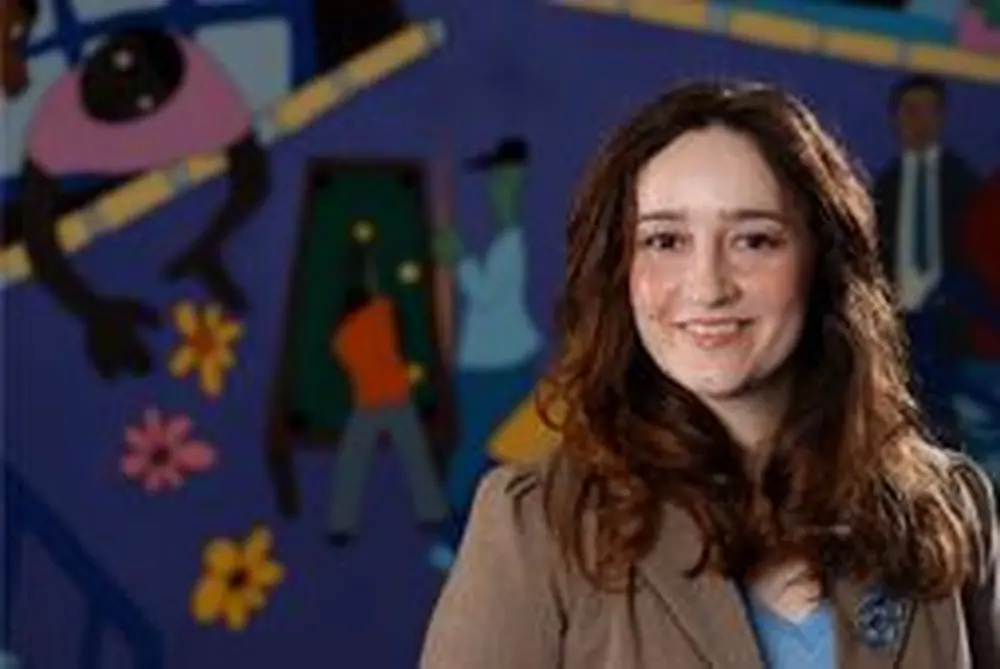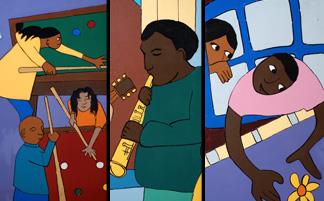

For Valeri Werpetinski, community service means more than merely donating time—it's about civic responsibility and public engagement.
She credits her parents for instilling in her such a strong commitment to the community. As a young girl, she participated in the Girl Scouts and helped her mom plan events for the PTA. Even today, her parents continue to serve on various city committees. Werpetinski has organized or been involved in many community projects and programs in Champaign-Urbana as an instructor of service-learning courses offered by the Department of Psychology. Currently a PhD student in the psychology department in the College of Liberal Arts and Sciences, Werpetinski is also a visiting specialist in education for the Center for Teaching Excellence, and the advisor for the Illini Mentor Program. Werpetinski excels in her ability to juggle her many roles to foster community collaboration.
"I didn't plan it out, but the nature of the work and the people that one encounters while doing it draws you in," says Werpetinski.
By combining her degrees in both psychology and art, Werpetinski has reached out to the local community in creative ways, earning her a 2005 Campus Award in Public Engagement from the University of Illinois.
"I'm passionate about community engagement and am committed to fostering personal and social responsibility as a function of the various roles that I adopt in my life," says Werpetinski.
But, while recognition is flattering, she is determined to continue her work of bringing the University and community together as partners for change.
For example, Werpetinski has directed numerous service projects that use art as a vehicle to unite the community. One such project has been ArtWorks, an arts-based youth employment program. The program linked community arts projects, job skills training for teens, and after-school programming for local children at the now closed Don Moyer Boys and Girls Club at Lakeside Terrace, a low-income housing development in Urbana.

Valeri Werpetinski directed the ArtWorks project that created this mural.
"We did neighborhood-improvement projects and got parents involved doing things like landscaping and painting a mural," Werpetinski explains. "We really wanted to create a community space."
Her time spent directing and working with ArtWorks and other projects led her to pursue ways of using the University's rich resources-its students and faculty-to make a bigger impact on the community. When the opportunity arose to integrate community psychology and service-learning for LAS students in a James Scholar honors section of Psychology 100, Werpetinski realized she was in just the right position to demonstrate the power of applying academic ideas to real-world situations.
Generally, to receive honors credit for a class, James Scholar students must write an extra paper or do an extra project. But for Werpetinski's course, they had to volunteer their time outside the classroom by mentoring children.
Students studied the usual Psych 100 material through a community psychology lens and then applied their knowledge in the field by organizing different projects while working with children at two locations of the Don Moyer Boys and Girls Club. Students had to do three hours of mentoring at the Lakeside Terrace and Park Street clubs per week.
"We got a lot of support from the University and the psychology department by allowing us to do service projects and maintain an ongoing relationship with the community," Werpetinski says.
At the end of the semester, the college students had become so invested in their mentoring relationships that they decided to form a registered student organization called Illini Mentor Program to continue their involvement outside of the classroom. Currently, they are working at the Don Moyer Boys and Girls Club at Park Street and the Stratton Elementary School 21st Century Learning Center, both in Champaign. The mentors help teens and children with their schoolwork and play games for a minimum of two hours per week.
Clubs like the Illini Mentor Program not only help the kids being mentored scholastically, but they also benefit the college students who participate, Werpetinski says. "The experience can lead to positive development, such as academic success and persistence in college."
As the group's advisor, Werpetinski uses her expertise and connections to improve the group's focus and make resources available to the student mentors. "Our big push now is to get more organized, focus on the quality and length of mentor relationships, and get more parental and community support for those relationships," she explains. "We want to build skills with the university students and youth through the one-on-one mentoring relationships."
From her unique position, Werpetinski is also working to unite LAS teaching staff behind the idea of "integrated service-learning." In other words, she wants faculty and graduate students to consider using service-learning in the classroom as a tool for students to apply their knowledge to the real world, both locally and globally. Werpetinski offers service-learning workshops through the Center for Teaching Excellence and would like to find opportunities to link study abroad to service projects.
"At the center, I work with the International TA Orientation-that's another entry point for building relationships and finding projects in other countries," she continues. International TA Orientation is offered in the spring and fall for TAs from other countries to acclimate them to the University surroundings.
By connecting U. of I. students and faculty to the community, Werpetinski says, "you become more invested because you see the relevance. You have more of a stake in the educational process."
Participating in the community culture has also been an educational process for her. Working with the Don Moyer Boys and Girls Club and local schools is about more than giving yourself-it's about shared experiences of the volunteers and the community members, mutually growing and connecting together.
"My best memories in Champaign-Urbana have been formed in these spaces," Werpetinski recollects. "The really good memories are chaotic, loud, emotional, and messy. I was both teaching and learning, and having fun in the process."


